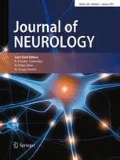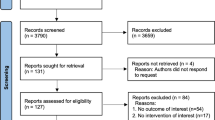Abstract
Regular exercise is important for patients with multiple sclerosis (MS) to maintain their functional ability and general health. The aim of this study was to determine whether a long–term exercise program has any effect on functional impairment or healthrelated quality of life (HRQOL) in subjects with mild to moderate MS. In a randomised controlled trial, subjects in the intervention group (n = 47) exercised according to a progressive exercise program, mainly consisting of resistance training, for six months. Subjects in the control group (n = 48) received no intervention. The subjects were assessed at baseline and at six months using the Multiple Sclerosis Functional Composite (MSFC), the Expanded Disability Status Scale (EDSS), the Functional Independence Measure (FIM), the MS Quality of Life–54 (MSQOL–54) questionnaire and the Centre for Epidemiologic Studies Depression Scale (CES–D). The drop–out rate was low (4%) with 91 subjects completing the study. At six months, the exercising subjects showed improvement on the MSFC (mean score change 0.114, 95% confidence interval [CI] 0.010 to 0.218), whereas the control subjects showed deterioration (mean score change –0.128, 95 % CI –0.232 to –0.025). The change between groups was statistically significant (interaction, p = 0.001). Consistent with the physical nature of the intervention, the change predominantly occurred in leg function/ambulation. The effect seen in the EDSS, FIM, MSQOL–54 or CES–D was nil. These findings indicate that MSFC is more sensitive than EDSS in the detection of improvement in functional impairment as a result of regular exercise. The unfavourable results from HRQOL do not rule out the possibility that other types of exercise programs may improve it in MS.
Similar content being viewed by others
References
Aalto AM, Aro AR, Teperi J (1999) Rand-36 as a measure of health-related quality of life. Reliability, construct validity and reference values in the Finnish general population. Helsinki, Stakes, Research Reports 101
Brosseau L, Wolfson C (1994) The inter-rater reliability and construct validity of the Functional Independence Measure for multiple sclerosis subjects. Clin Rehabil 8:107–115
Cohen J (1977) Statistical power analysis for the behavioral sciences, revised ed. Academic Press, London
Cohen JA, Cutter GR, Fischer JS, et al. (2001) Use of the Multiple Sclerosis Functional Composite as an outcome measure in a phase 3 clinical trial. Arch Neurol 58:961–967
Cohen JA, Cutter GR, Fischer JS, et al. (2002) Benefit of interferon beta-1a on MSFC progression in secondary progressive MS. Neurology 59:679–687
Cutter GR, Baier ML, Rudick RA, et al. (1999) Development of a multiple sclerosis functional composite as a clinical trial outcome measure. Brain 122:871–882
DeBolt LS,McCubbin JA (2004) The effects of home-based resistance exercise on balance, power, and mobility in adults with multiple sclerosis. Arch Phys Med Rehabil 85:290–297
Fergusson D, Aaron SD, Guyatt G, Hébert P (2002) Post-randomisation exclusions: the intention to treat principle and excluding patients from analysis. BMJ 325:652–654
Fischer JS, Jak AJ,Kniker JE, et al. (1999) Administration and Scoring Manual for the Multiple Sclerosis Functional Composite Measure (MSFC). Demos, New York
Freeman JA, Hobart JC, Thompson AJ (2001) Does adding specific items to a generic measure (the SF-36) improve measurement? Neurology 57:68–74
Freeman JA, Thompson AJ, Fitzpatrick R, et al. (2001) Interferon-beta1b in the treatment of secondary progressive MS. Impact on quality of life. Neurology 57:1870–1875
Granger CV, Cotter AC, Hamilton BB, et al. (1990) Functional assessment scales: A study of persons with multiple sclerosis. Arch Phys Med Rehabil 71:870–875
Guillemin F, Bombardier C, Beaton D (1993) Cross-cultural adaptation of health-related quality of life measures: literature review and proposed guidelines. J Clin Epidemiol 46:1417–1432
Hays RD, Sherbourne CD, Mazel RM (1993) The RAND 36-Item Health Survey 1.0. Health Econ 2:217–227
Johnson KB (1996) Exercise, drug treatment, and the optimal care of multiple sclerosis patients. Ann Neurol 39:422–423
Kurtzke JF (1983) Rating neurologic impairment in multiple sclerosis: an expanded disability status scale (EDSS). Neurology 33:1444–1452
Lawlor DA, Hopker SW (2001) The effectiveness of exercise as an intervention in the management of depression: systematic review and metaregression analysis of randomised controlled trials. BMJ 322:763–767
Meyers AR, Gage H, Hendricks A (2000) Health-related quality of life in neurology. Arch Neurol 57:1224–1227
Mostert S, Kesselring J (2002) Effects of a short-term exercise training program on aerobic fitness, fatigue, health perception and activity level of subjects with multiple sclerosis. Mult Scler 8:161–168
Naughton MJ, Wiklund I (1993) A critical review of dimension-spesific measures of health-related quality of life in cross-cultural research. Qual Life Res 2:397–432
Nordvedt MV, Riise T (2003) The use of quality of life measures in multiple sclerosis research. Mult Scler 9:63–72
Oken BS, Kishiyama S, Zajdel D, et al. (2004) Randomized controlled trial of yoga and exercise in multiple sclerosis. Neurology 62:2058–2064
Ozakbas S, Cagiran I, Ormeci B, Idiman E (2004) Correlations between multiple sclerosis functional composite, expanded disability status scale and health-related quality of life during and after treatment of relapses in patients with multiple sclerosis. J Neurol Sci 218:3–7
Patti F, Capocardo M, Palermo F, et al. (2003) Health-related quality of life and depression in an Italian sample of multiple sclerosis patients. J Neurol Sci 211:55–62
Patzold T, Schwengelbeck M, Ossege LM, et al. (2002) Changes of the MS functional composite and EDSS during and after treatment of relapses with methylprednisolone in patients with multiple sclerosis. Acta Neurol Scand 105:164–168
Penninx BW, Rejeski WJ, Pandya J, et al. (2002) Exercise and depressive symptoms: A comparison of aerobic and resistance exercise effects on emotional and physical function in older persons with high and low depressive symptomatology. J Gerontol B Psychol Sci Soc Sci 57:P124–P132
Petajan JH, Gappmaier E, White AT, et al. (1996) Impact of aerobic training on fitness and quality of life in multiple sclerosis. Ann Neurol 39:432–441
Petajan JH, White AT (1999) Recommendations for physical activity in patients with multiple sclerosis. Sports Med 27:179–191
Pfennings L, Cohen L, Adèr H, et al. (1999) Exploring differences between subgroups of multiple sclerosis patients in health-related quality of life. J Neurol 246:587–591
Ponichtera-Mulcare JA, Mathews T, Barrett PJ, Gupta SC (1997) Change in aerobic fitness of patients with multiple sclerosis during a 6-month training program. Sports Med Train Rehabil 7:265–272
Poser CM, Paty DW, Scheinberg L, et al. (1983) New diagnostic criteria for multiple sclerosis: guidelines for research protocols. Ann Neurol 13:227–231
Radloff LS (1977) The CES-D Scale: a self-report depression scale for research in the general population. Appl Psychol Meas 1:385–401
Rudick RA, Cutter G, Reingold S (2002) The Multiple Sclerosis Functional Composite: a new clinical outcome measure for multiple sclerosis trials. Mult Scler 8:359–365
Sharrack B, Hughes RA, Soudain S, et al. (1999) The psychometric properties of clinical rating scales used in multiple sclerosis. Brain 122:141–159
Solari A, Filippini G, Mendozzi L, et al. (1999) Validation of Italian multiple sclerosis quality of life 54 questionnaire. J Neurol Neurosurg Psychiatry 67:158–162
Sutherland G, Andersen MB (2001) Exercise and multiple sclerosis: physiological, psychological, and quality of life issues. J Sports Med Phys Fitness 41:421–432
Uitdehaag BM, Adèr HJ, Roosma TJ, et al. (2002) Multiple sclerosis functional composite: impact of reference population and interpretation of changes. Mult Scler 8:366–371
Vickrey BG, Hays RD, Harooni R, et al. (1995) A health-related quality of life measure for multiple sclerosis. Qual Life Res 4:187–206
Vickrey BG, Hays RD, Genovese BJ, et al. (1997) Comparison of a generic to disease-targeted health-related quality of life measures for multiple sclerosis. J Clin Epidemiol 50:557–569
Ware JE, Sherbourne CD (1992) The MOS 36-item short-form health survey (SF-36). I. Conceptual framework and item selection. Med Care 30:473–483
Whitaker JN, McFarland HF, Rudge P, Reingold SC (1995) Outcomes assessment in multiple sclerosis clinical trials: a critical analysis. Mult Scler 1:37–47
Author information
Authors and Affiliations
Corresponding author
Rights and permissions
About this article
Cite this article
Romberg, A., Virtanen, A. & Ruutiainen, J. Long–term exercise improves functional impairment but not quality of life in multiple sclerosis. J Neurol 252, 839–845 (2005). https://doi.org/10.1007/s00415-005-0759-2
Received:
Accepted:
Published:
Issue Date:
DOI: https://doi.org/10.1007/s00415-005-0759-2



